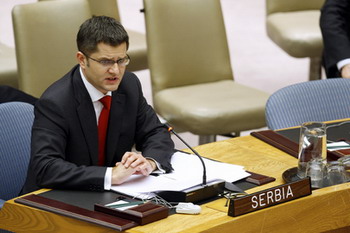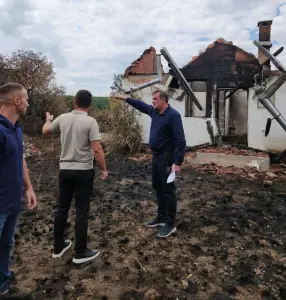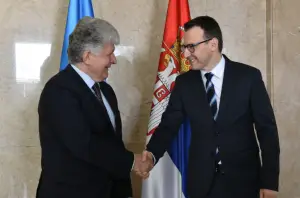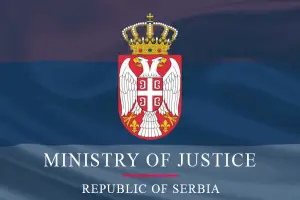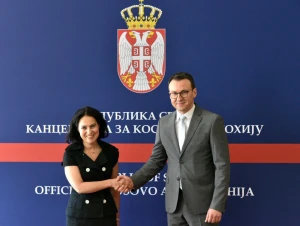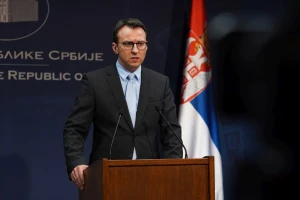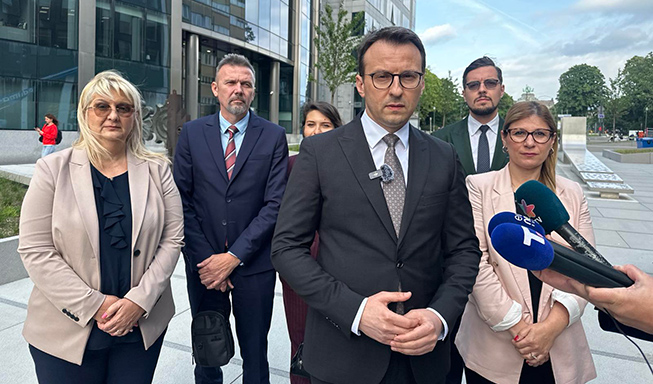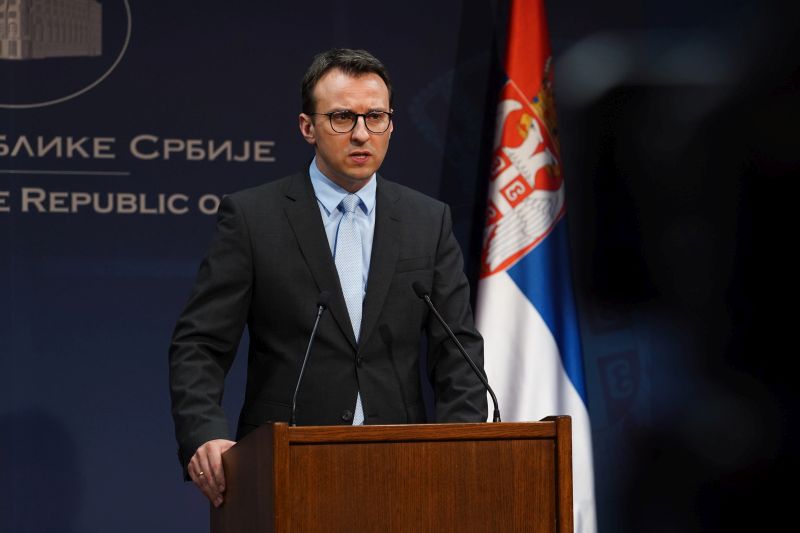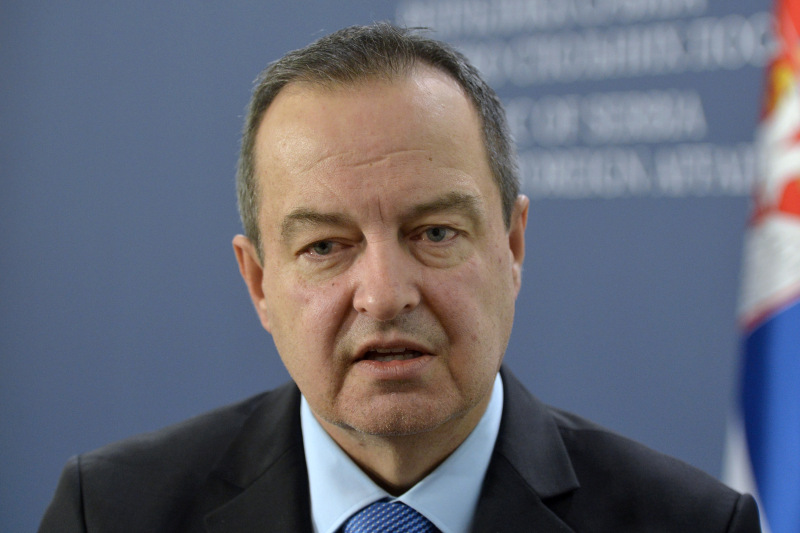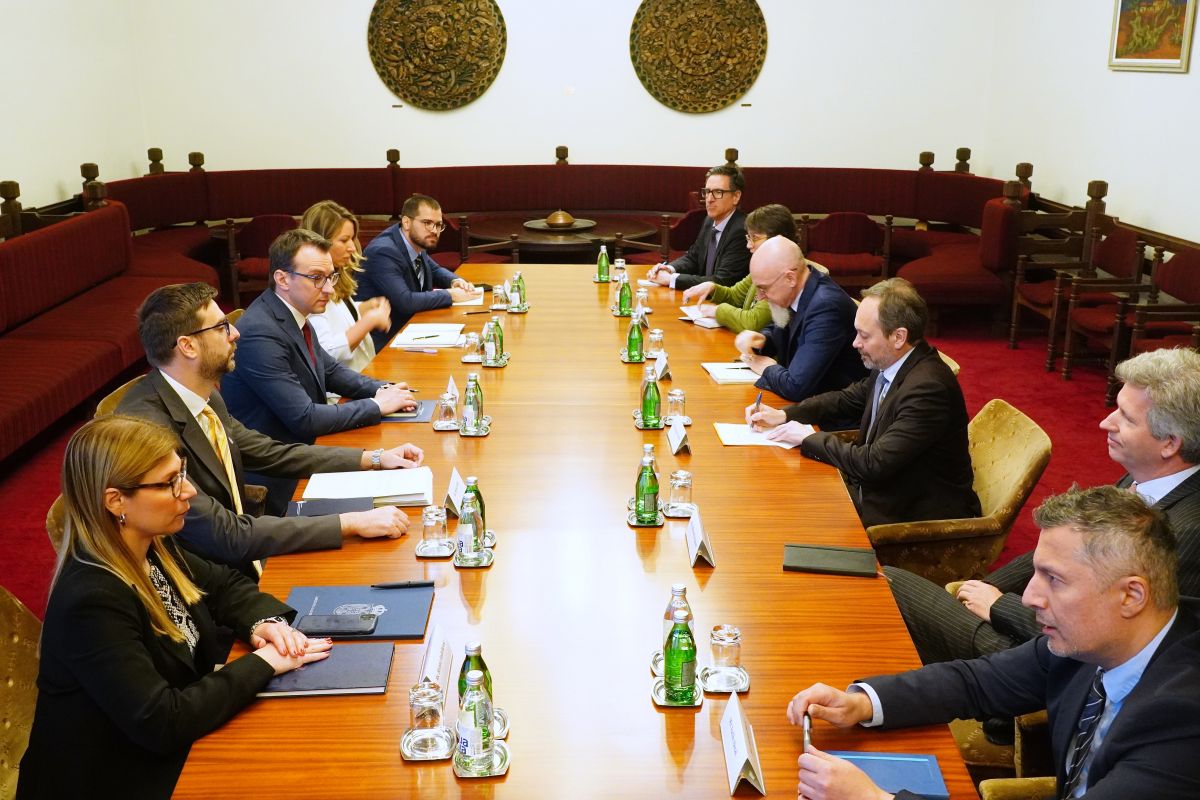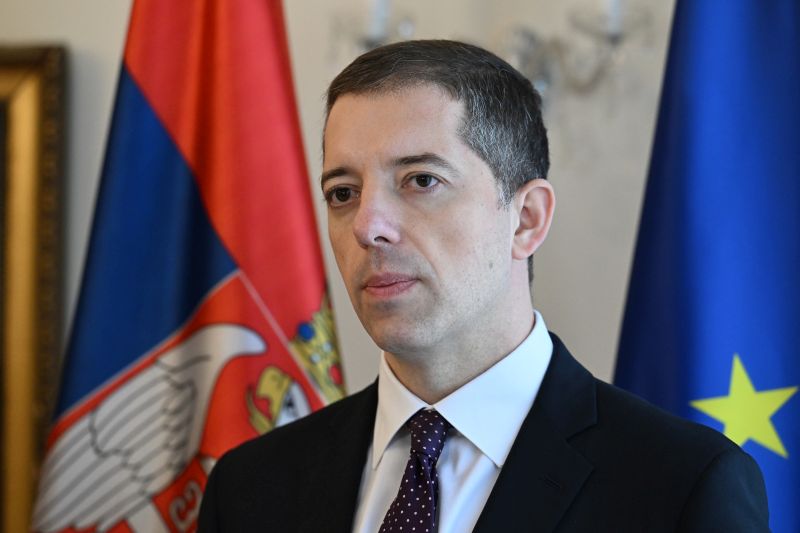Q:
A:
UN Security Council must prevent unilateral acts of violence in Kosovo-Metohija
Belgrade/New York,
29 November 2011
Minister of Foreign Affairs Vuk Jeremic called on the UN Security Council today to take action without delay and ensure that unilateral acts of violence do not happen again in Kosovo-Metohija, warning that the security situation in the southern province has deteriorated drastically.
Speaking at the UN Security Council session dedicated to the situation in Kosovo-Metohija, Jeremic called on all actors in northern Kosovo - KFOR and EULEX, as well as representatives of local Serbs to engage in dialogue and work together to establish peace immediately.
He pointed out that the removal of barricades is in the interest of peace and stability, but that this should be achieved only through peaceful means.
The Minister of Foreign Affairs urged the Security Council to ensure that unilateral actions of Pristina are no longer permitted and to do so in a clear, indisputable and impartial status-neutral manner.
I request from this body to take this crucial step without delay, Jeremic declared. He said that if the goal is to restore security and improve the lives of people in Kosovo-Metohija, then there is no justification for this call not to be accepted immediately.
He stated that at this sensitive moment it is essential to send the right message and learn the lesson from recent incidents at Dudin Krs and in Jagnjenica yesterday, where a conflict broke out between KFOR soldiers and Serbian population.
Urging for dialogue, peaceful removal of barricades and exit from the cycle of violence, Jeremic noted that it is indicative that almost every time a new round of dialogue between Belgrade and Pristina is to be held, unilateralism suddenly returns to the stage.
The negotiations and the use of instruments of coercion are mutually exclusive, he said.
The choice could not be clearer - or peaceful dialogue, or unilateral action. Serbia is ready for the former and it categorically rejects the latter, Jeremic exclaimed.
Jeremic recalled that the security situation in Kosovo has deteriorated dramatically since the previous period that was covered by the report of UN Secretary General Ban Ki-moon, and it was not possible to reach a consensus within the UN Security Council that unilateralism and the use of force are unacceptable.
Recalling that in the sixth round of dialogue between Belgrade and Pristina a status-neutral solution for customs stamps was achieved, the Foreign Minister added that this was followed by another attempt to impose an outcome regarding the administrative crossings outside dialogue.
In this context, Jeremic reminded the UN Security Council of the document entitled "Operational Plan of the Kosovo police," which states that all operations will be "conducted under the sovereignty of Kosovo and in accordance with the laws of Kosovo".
This is obviously in contravention of UN Security Council Resolution 1244 and is a drastic deviation from the UN’s status-neutral framework, Jeremic observed.
Regardless of this, KFOR and EULEX chose to endorse the operation launched on 16 September, although warnings were issued beforehand by the UN Security Council that this would mean a transgression of KFOR and EULEX’s mandates and a violation of UN Security Council Resolution 1244.
The inevitable happened and the Serbian population in northern Kosovo responded by reinforcing road blocks and erecting new ones, and their determination to resist the imposition of the unwanted regime is one of the most obvious elements of reality in the field.
Jeremic underlined that the fact that the situation in the south of Kosovo-Metohija is also aggravating cannot be ignored.
Recalling the brutal murder of Serb Aleksandar Putnik in the village of Zrze near Orahovac, Jeremic pointed to a number of cases of vandalism against Serbian churches and monasteries, stoning of automobiles, burnt houses of returnees, thefts and similar.
None of these cases have been resolved therefore it is no wonder that under such circumstances the number of Serb returnees is still small, he added.
Jeremic also recalled that a year ago the Council of Europe published a report on illicit trade in human organs, but that little has been done since then to ascertain the truth.
The recent appointment of Clint Williamson as chief prosecutor of the EULEX’s team is a positive event, he said, adding that Serbia will help Williamson and his team in every way in order to determine the truth about events in the province.
However, this is insufficient because the case refers to the territory outside Kosovo as well, he added.
Jeremic reiterated that the investigation must be led under the auspices of the UN Security Council, as was the case in all previous investigations into war crimes in the Balkans.
The Minister underlined that there are no reasons why this investigation should not be conducted in the same manner, because this is the only way it will be fair and transparent.
The spokesperson for the EULEX’s team said that all details will be classified until the investigation is completed, which could take several years, Jeremic noted, adding that this is unheard of and unacceptable.
If Hague tribunal officials are required to submit a report to the UN Security Council every six months, why should those in charge of the investigation into human organ trafficking do otherwise, Jeremic stated.
He also pointed to the importance of the witness protection programme in the province, adding that the recent mysterious death of Agim Zogaj, a key witness in an important war crimes process against former KLA commander Fatmir Ljimaj, reinforced the belief that EULEX is incapable of guaranteeing safety to those under its protection.
He pointed out that the removal of barricades is in the interest of peace and stability, but that this should be achieved only through peaceful means.
The Minister of Foreign Affairs urged the Security Council to ensure that unilateral actions of Pristina are no longer permitted and to do so in a clear, indisputable and impartial status-neutral manner.
I request from this body to take this crucial step without delay, Jeremic declared. He said that if the goal is to restore security and improve the lives of people in Kosovo-Metohija, then there is no justification for this call not to be accepted immediately.
He stated that at this sensitive moment it is essential to send the right message and learn the lesson from recent incidents at Dudin Krs and in Jagnjenica yesterday, where a conflict broke out between KFOR soldiers and Serbian population.
Urging for dialogue, peaceful removal of barricades and exit from the cycle of violence, Jeremic noted that it is indicative that almost every time a new round of dialogue between Belgrade and Pristina is to be held, unilateralism suddenly returns to the stage.
The negotiations and the use of instruments of coercion are mutually exclusive, he said.
The choice could not be clearer - or peaceful dialogue, or unilateral action. Serbia is ready for the former and it categorically rejects the latter, Jeremic exclaimed.
Jeremic recalled that the security situation in Kosovo has deteriorated dramatically since the previous period that was covered by the report of UN Secretary General Ban Ki-moon, and it was not possible to reach a consensus within the UN Security Council that unilateralism and the use of force are unacceptable.
Recalling that in the sixth round of dialogue between Belgrade and Pristina a status-neutral solution for customs stamps was achieved, the Foreign Minister added that this was followed by another attempt to impose an outcome regarding the administrative crossings outside dialogue.
In this context, Jeremic reminded the UN Security Council of the document entitled "Operational Plan of the Kosovo police," which states that all operations will be "conducted under the sovereignty of Kosovo and in accordance with the laws of Kosovo".
This is obviously in contravention of UN Security Council Resolution 1244 and is a drastic deviation from the UN’s status-neutral framework, Jeremic observed.
Regardless of this, KFOR and EULEX chose to endorse the operation launched on 16 September, although warnings were issued beforehand by the UN Security Council that this would mean a transgression of KFOR and EULEX’s mandates and a violation of UN Security Council Resolution 1244.
The inevitable happened and the Serbian population in northern Kosovo responded by reinforcing road blocks and erecting new ones, and their determination to resist the imposition of the unwanted regime is one of the most obvious elements of reality in the field.
Jeremic underlined that the fact that the situation in the south of Kosovo-Metohija is also aggravating cannot be ignored.
Recalling the brutal murder of Serb Aleksandar Putnik in the village of Zrze near Orahovac, Jeremic pointed to a number of cases of vandalism against Serbian churches and monasteries, stoning of automobiles, burnt houses of returnees, thefts and similar.
None of these cases have been resolved therefore it is no wonder that under such circumstances the number of Serb returnees is still small, he added.
Jeremic also recalled that a year ago the Council of Europe published a report on illicit trade in human organs, but that little has been done since then to ascertain the truth.
The recent appointment of Clint Williamson as chief prosecutor of the EULEX’s team is a positive event, he said, adding that Serbia will help Williamson and his team in every way in order to determine the truth about events in the province.
However, this is insufficient because the case refers to the territory outside Kosovo as well, he added.
Jeremic reiterated that the investigation must be led under the auspices of the UN Security Council, as was the case in all previous investigations into war crimes in the Balkans.
The Minister underlined that there are no reasons why this investigation should not be conducted in the same manner, because this is the only way it will be fair and transparent.
The spokesperson for the EULEX’s team said that all details will be classified until the investigation is completed, which could take several years, Jeremic noted, adding that this is unheard of and unacceptable.
If Hague tribunal officials are required to submit a report to the UN Security Council every six months, why should those in charge of the investigation into human organ trafficking do otherwise, Jeremic stated.
He also pointed to the importance of the witness protection programme in the province, adding that the recent mysterious death of Agim Zogaj, a key witness in an important war crimes process against former KLA commander Fatmir Ljimaj, reinforced the belief that EULEX is incapable of guaranteeing safety to those under its protection.

